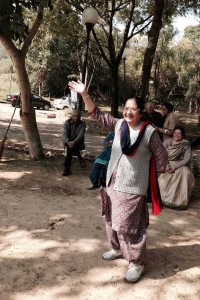Contact Us




Mindfulness is living in the moment. It involves openness and curiosity towards our feelings. When we become mindful, we realize that we are not our thoughts; we become an observer of our thoughts from moment to moment, without judging them.
Mindfulness becomes specially useful for the elderly because it focuses on the interconnectedness of mind and body. With age we are more likely to experience physical health problems, and along with it associated psychological issues. Also with the onset of retirement, the life of an elderly changes from busy structured schedules to relaxed ones. For some people it is positively assimilated, leading to reorganization of life; for others, it is significantly damaging, affecting their psychic structure. These effects can manifest through feelings and symptoms like anxiety, depression, irritability, and general dissatisfaction, resulting in a reduction in quality of life. Practicing mindfulness can make it much easier for people to deal with these changes.
5 benefits of Being mindful:
1) Reduces rumination – Mindfulness helps people resist the trap of constantly going over past issues and events or getting overwhelmed by worries about the future.
2) De-stresses – It helps people relax, become more aware and helps cope with daily stress. It also helps in making better decisions.
3) Eases aches and pains – Often the back, neck or other body aches and pains we struggle with are there partly in our head. Mindfulness can cut pain perception significantly.
4) Slows down neurodegenerative diseases – It brings about positive changes in the brain, and helps in slowing the progression of age related cognitive disorders like Alzheimer’s disease and dementia.
5) Reduces feelings of loneliness – Not only that, it increases compassion and resilience, leading to a happier and more fulfilling life.
Organisations such as the Mental Health Foundation, promote mindfulness as an effective tool to help people improve their general wellbeing and enjoy their lives. One doesn’t have to be clinically depressed or ill to benefit from mindfulness. In order to feel more in control of our minds and our lives, to find the sense of balance that eludes us, we need to step out of the current, to pause and to rest in stillness—to stop doing and focus on just being. Whenever one is focused on the sensations of the present moment and is not carried off on a stream of anxious thoughts, one is being mindful.
Mindfulness usually requires a commitment of about 15 – 60 minutes of formal practice a day. A good start is sitting in a quiet place and training the mind to stop wandering and become more focused on observing the breath, relaxing the body, and accepting thoughts and feelings.
Here are 6 ways for people of all ages to be mindful:
1) Meditate: Meditation is the quintessential mindfulness practice. It has been shown to be a highly effective in managing emotional challenges including anxiety, depression and stress, and boost over all well-being.
2) Take walks: Simply going for a walk can be excellent way to calm the mind, gain new perspective and facilitate greater awareness. Walking through green spaces may actually put the brain into a meditative state. It is known to trigger “involuntary attention,” meaning that it holds attention while also allowing for reflection.
3) Be creative: Elderly can try engaging in their favorite creative practice, whether it’s baking, doodling, or singing in the shower, and see how their thoughts quiet down as they get into a state of flow.
4) Seek out new experiences: Openness to experience is a by-product of living mindfully, as those who prioritize presence and peace of mind tend to enjoy taking in and savoring moments of wonder and simple joy. New experiences, in turn, can help the elderly become more mindful.
5) Spend time in nature: This is one of the most powerful ways of giving yourself a mental reboot and reinstating a sense of ease and wonder. Research has found that being outdoors can relieve stress, while also improving energy levels, memory and attention.
6) Remember not to take yourself so seriously: If we remember to laugh and keep a balance through ups and downs, then we already have a head-start in mastering the art of mindfulness. Joyful laughter and meditation are known to have a similar impact on the brain!
Mindfulness is a powerful tool for experiencing happiness when practiced regularly. As Mother Teresa put it, “Be happy in the moment, that’s enough. Each moment is all we need, not more.”
Samvedna Senior Activity Centre in Sector 57, Gurgaon, is a place for seniors to nourish their mind, body and soul. We have a series of programmes to suit different interests.
The Mind, Body and Soul programme at the centre takes a systematic approach to holistic wellness. It has been designed with the aim of facilitating harmonious physical, mental, emotional and spiritual development of seniors. Some of the activities in this programme are yoga, meditation, computer classes, spiritual discussions, creativity workshops and mind stimulation exercises. Know more here –
https://www.samvednacare.com/home-care-services/home-care-package/caregiver-services